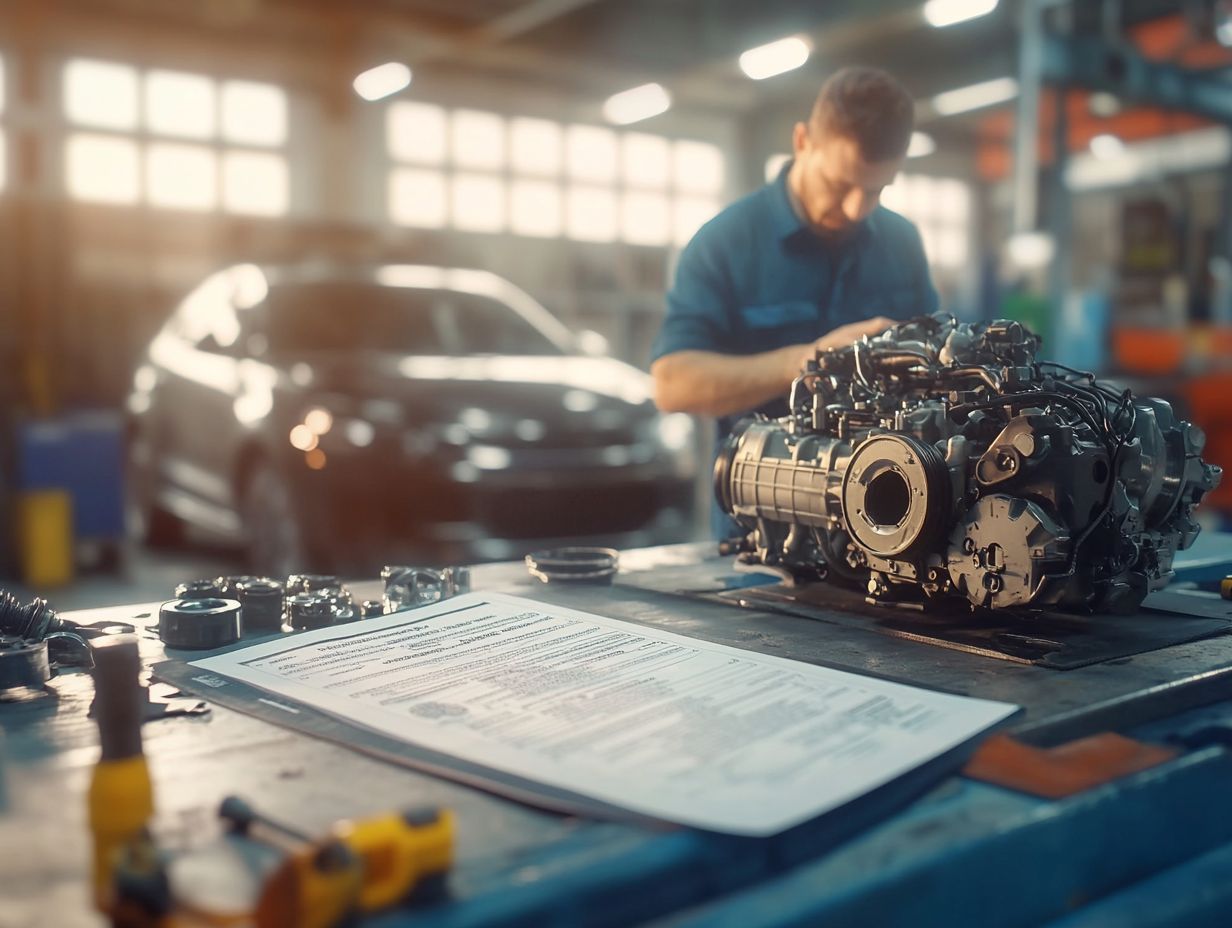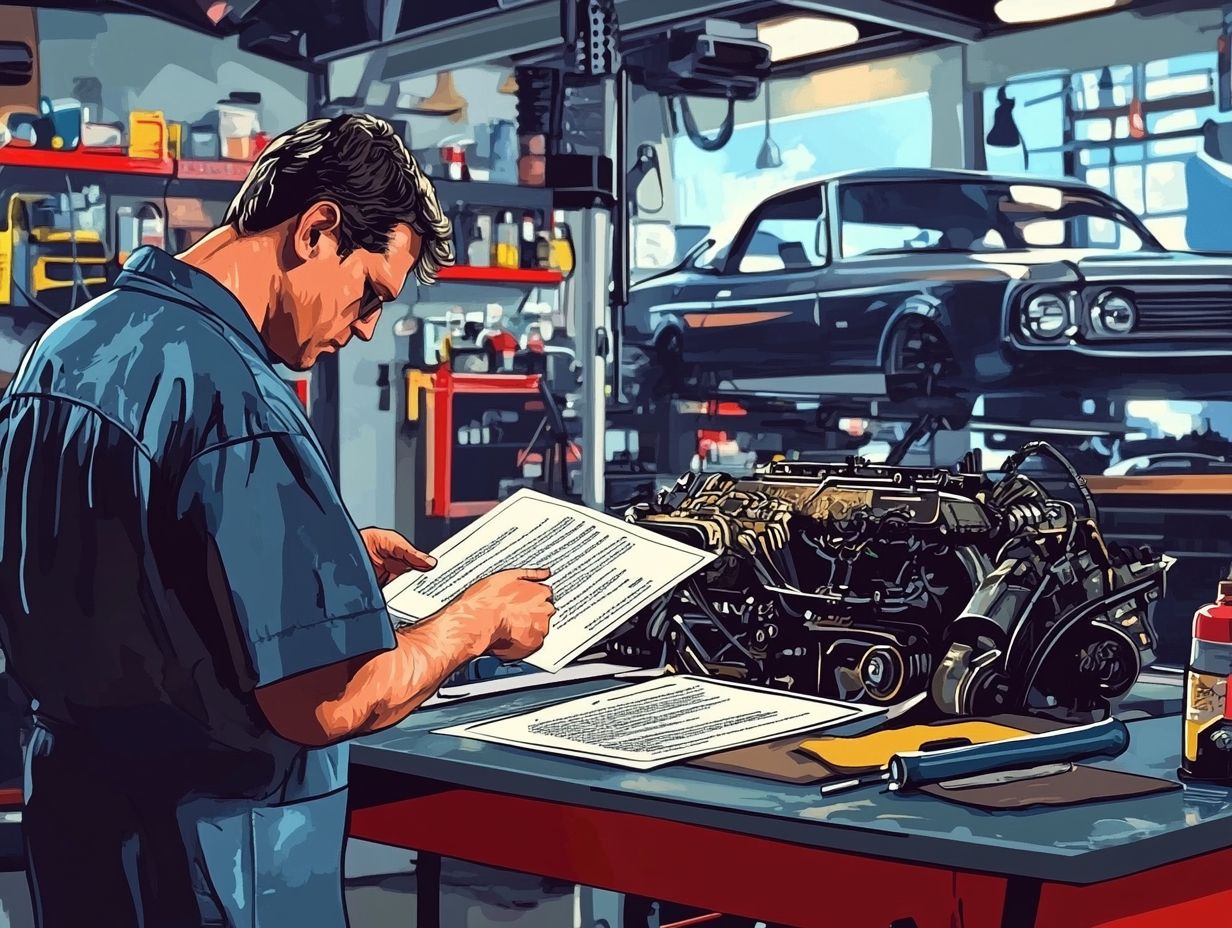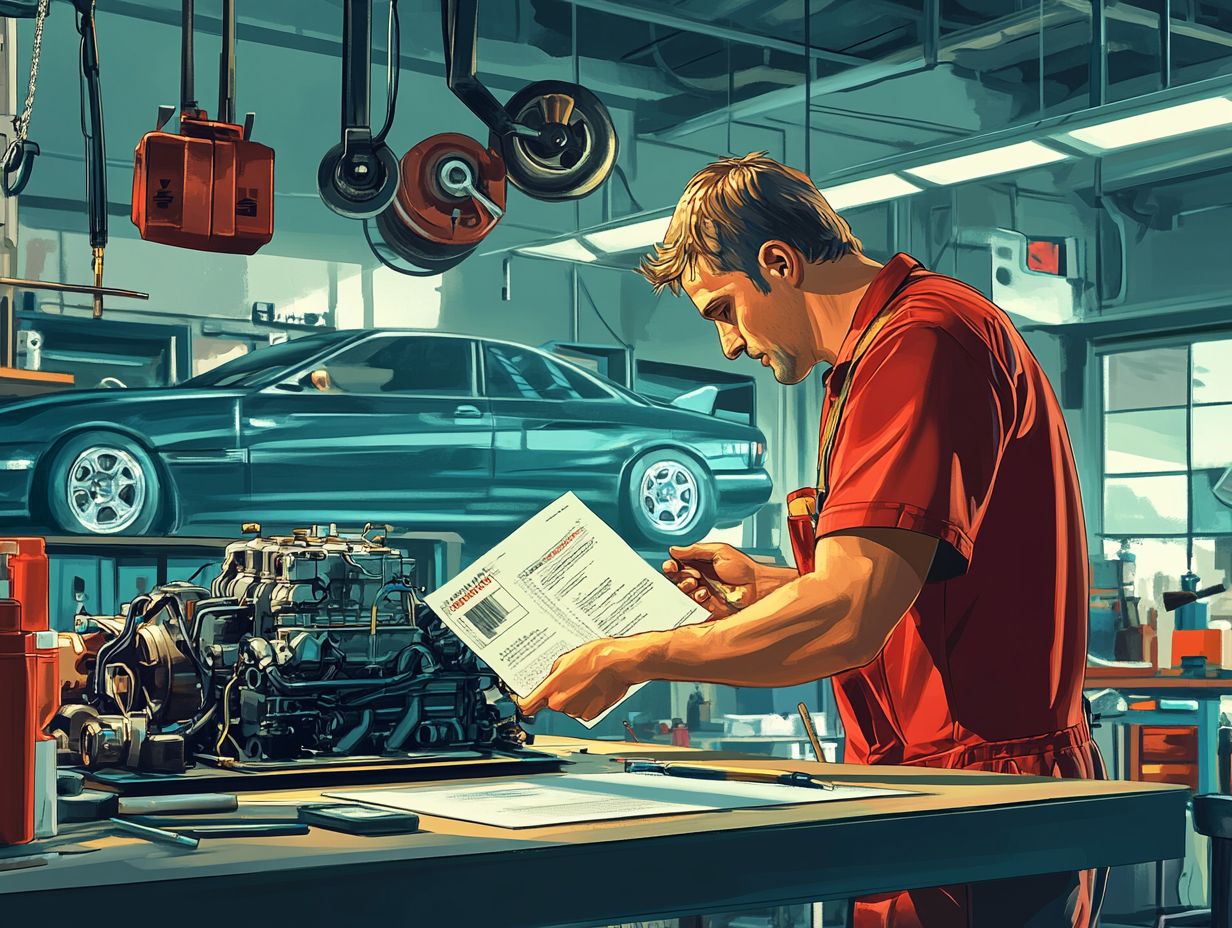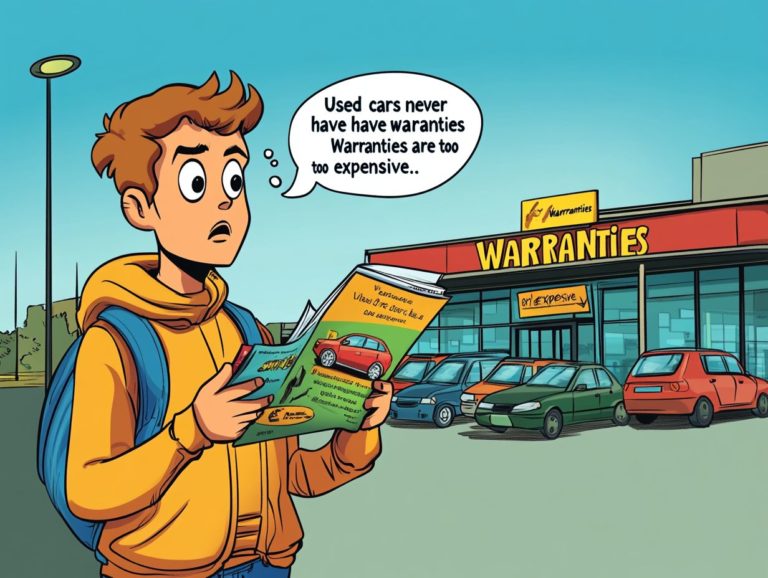Are Car Warranties Worth the Cost?
Car warranties play a vital role in the ownership experience, providing essential protection and peace of mind against unforeseen repairs. Choosing a car warranty can be daunting due to the many options available.
This article clarifies car warranties, their benefits, and important factors like cost and coverage. It will also explore alternatives and guide you in determining whether a warranty is a worthwhile investment for your situation.
Contents
- Key Takeaways:
- Understanding Car Warranties
- Benefits of Car Warranties
- Factors to Consider
- Alternatives to Car Warranties
- Frequently Asked Questions
- 1. Are car warranties worth the cost?
- 2. What factors should I consider when deciding if a car warranty is worth the cost?
- 3. Do all cars come with a warranty?
- 4. Are there different types of car warranties?
- 5. Can a car warranty save me money in the long run?
- 6. What should I do if my car warranty is about to expire?
Key Takeaways:

- Car warranties can provide financial protection and peace of mind for car owners, but the cost and coverage should be carefully considered before purchasing.
- Extended warranties and vehicle service contracts are alternative options to traditional car warranties, but may also come with their own limitations and costs.
- Deciding whether to buy a car warranty? It’s crucial to evaluate your unique needs now!
Understanding Car Warranties
Grasping the nuances of car warranties is crucial for you as a car buyer. These warranties offer essential coverage options that safeguard your investment, whether you re purchasing a brand-new vehicle under a factory warranty or considering a used car that might benefit from an extended warranty.
By familiarizing yourself with the various types of warranties available ranging from manufacturer warranties to aftermarket options you enable yourself to make informed choices regarding coverage for repairs, maintenance, and unforeseen expenses.
What is a Car Warranty?
A car warranty is essentially a service contract designed to cover specific repairs and maintenance for your vehicle. It gives you peace of mind by shielding you from unexpected repair costs.
Think of it as your money-saving option one that can save you a considerable amount should your car encounter defects or car breakdowns. This coverage can ensure that necessary repairs, like engine troubles or electrical system glitches, are handled without you having to shoulder the entire financial load.
Warranties typically fall into several categories: there are manufacturer warranties that come with new cars, and there are extended warranties you can purchase once the original coverage runs out.
It’s crucial to understand the difference between a warranty and insurance. While warranties focus on covering repair costs for mechanical failures, insurance policies primarily deal with accidents or damages resulting from collisions, adding an extra layer of security for you as a car owner.
Types of Car Warranties
There are various types of car warranties available, each tailored to meet specific consumer needs. You ll encounter factory warranties, extended warranties, powertrain warranties, dealer warranties, and aftermarket warranties, each differing in terms and coverage.
Understanding the nuances among these warranties is essential for anyone looking to safeguard their investment. Factory warranties, typically included when you purchase a new vehicle, cover defects in workmanship and materials for a defined period or mileage.
On the flip side, extended warranties act as an added layer of protection, extending coverage beyond the factory terms this can be incredibly valuable as vehicles begin to age. Dealership warranties are usually offered by the seller and may come with unique perks, though it’s important to note they might have limitations.
In contrast, aftermarket warranties can provide additional options tailored to your specific needs, but their reliability and terms can vary widely. It s crucial for you to carefully evaluate each option to ensure you select the warranty that aligns perfectly with your requirements.
Benefits of Car Warranties
Car warranties present a wealth of advantages for vehicle owners. They provide essential financial protection against the burden of costly repairs, allowing you to enjoy your vehicle with confidence.
With a warranty in place, you can experience peace of mind throughout your ownership journey, knowing that unexpected maintenance expenses won’t catch you off guard as your vehicle ages.
Find the right warranty for your vehicle today and drive with confidence!
Financial Protection

One of the primary benefits of car warranties is the financial protection they offer, covering repair costs that might arise from car problems or necessary maintenance often with the added bonus of reducing your deductible, which is the amount you pay out of pocket before insurance kicks in.
This protection is essential for car buyers like you. It helps alleviate unforeseen expenses that can quickly add up and strain your household budget. With a comprehensive warranty, you gain peace of mind knowing that if your vehicle encounters a covered malfunction, you won t have to shoulder the repair costs alone.
This sense of security not only boosts your confidence in vehicle ownership but also elevates your overall buying experience. Therefore, selecting a well-suited warranty acts as a vital cushion against unexpected financial burdens, allowing you to preserve your investment without the weight of debilitating stress.
Peace of Mind
A car warranty gives you peace of mind by ensuring your vehicle is reliable and that you have coverage options for any maintenance needs that may arise during your ownership.
With a warranty in place, you can confidently stick to regular maintenance schedules. You won t have to worry about unexpected repair costs throwing your budget off course. This assurance enhances your trust in your vehicle s performance and longevity, knowing that significant repairs are often covered if they become necessary.
A thoughtfully designed warranty serves as a clear indicator of the manufacturer s commitment to quality, reinforcing your confidence in your investment. By alleviating financial surprises, a warranty allows you to fully enjoy your driving experience while prioritizing essential upkeep, ultimately fostering a lasting relationship between you and your automobile.
Factors to Consider
When contemplating a car warranty, several crucial factors demand your attention. You need to weigh the cost of the warranty itself, the duration of coverage offered, and the specifics of what is included.
Consider your vehicle’s model, mileage, and age as they can profoundly impact your decisions.
Cost of the Warranty
The price of a warranty is crucial for every car buyer. It varies significantly based on factors like the type of coverage, vehicle model, and additional expenses, including deductibles and average repair costs.
Grasping these intricacies is vital for making a well-informed decision. Luxury vehicles, for instance, often carry higher warranty prices due to their intricate components and the elevated costs of parts. Think carefully about how the deductible will affect your overall budget. Typically, a plan with a lower premium can result in higher out-of-pocket expenses when a claim arises.
Striking the right balance between premium affordability and the potential financial implications of repairs can profoundly shape your satisfaction as a car owner and influence your financial stability over time.
Length of Coverage
The length of coverage in a car warranty plays a crucial role in determining its value. It influences how long your protection lasts and how well it aligns with your vehicle’s expected lifespan.
Knowing your warranty lasts long gives you confidence against unexpected repairs. Long-term warranties, for example, are particularly appealing if you plan to keep your vehicle for a decade or more; they could save you thousands in repair costs over time.
On the other hand, short-term options might fit better for those who frequently change cars. They offer coverage that aligns with your ownership timeline while often being more budget-friendly.
Deciding between basic guarantees and extended plans can significantly impact not just your financial planning but also your overall satisfaction with your vehicle’s performance and reliability.
What is Covered?

Understanding the nuances of your car warranty is crucial. It determines which repairs and parts are eligible for protection, significantly influencing your maintenance strategy and repair costs.
A comprehensive grasp of warranty coverage enables you to make well-informed decisions regarding repairs and services. Most warranties cover essential components like the engine, transmission, and electrical systems. This coverage offers peace of mind in case of unexpected malfunctions.
Installation labor for specific repairs is often included. Certain circumstances, such as breakdowns due to manufacturing defects or wear and tear on critical parts, may fall under standard provisions. However, cosmetic damage or routine maintenance is usually excluded.
By understanding these coverage details, you can navigate your repair options with more strategy and confidence.
Alternatives to Car Warranties
While car warranties offer substantial advantages, several alternatives are available. Consider extended warranties, vehicle service contracts, or even the option of self-insuring.
Each of these choices has its own implications, particularly regarding repair costs and financial risk.
Extended Warranties
Extended warranties present a compelling alternative to standard car warranties. They offer enhanced coverage options that boost your vehicle’s reliability and shield you from unexpected repair costs.
Unlike standard warranties, which usually provide limited coverage for a specific duration or mileage, extended warranties are designed to address a wider array of issues. They can extend well beyond the original warranty period, often encompassing vital components such as the engine, transmission, and electrical systems. This additional layer of protection lets you navigate the roads with greater confidence.
By opting for an extended warranty, you reduce the risks tied to potential breakdowns and may also elevate your vehicle’s resale value. Many buyers see such warranties as a valuable advantage, enhancing your car’s appeal in the market.
Vehicle Service Contracts
Vehicle service contracts are agreements that cover specific repairs and maintenance needs throughout your vehicle s lifespan.
These contracts can vary significantly from traditional warranties. They offer a range of options tailored to your driving habits and the type of vehicle you own. While warranties usually cover manufacturing defects for a limited time, vehicle service contracts often include routine maintenance services and wear-and-tear components. This proactive strategy allows you to manage unexpected expenses with greater ease.
Such service contracts can cover various areas, including electrical systems, powertrains, and even roadside assistance. This provides you with peace of mind as you navigate the road ahead, helping you avoid potentially costly repairs down the line.
Self-Insuring
Self-insuring allows you, as a vehicle owner, to set aside savings for potential repair costs instead of relying on a warranty. This gives you greater control, but it also comes with financial risks.
By adopting this method, you can manage your finances and vehicle maintenance more effectively. Prioritizing savings lets you allocate funds for unexpected repairs, making your approach a proactive choice rather than a reactive reliance on warranties. However, it requires discipline and careful budgeting; an unexpected major repair could strain your finances.
It s essential to weigh the pros and cons carefully. While self-insuring can lead to significant savings over time, it may expose you to larger expenses without the safety net that traditional warranties provide.
Frequently Asked Questions

1. Are car warranties worth the cost?
Whether a car warranty is worth it depends on your needs and the warranty details. It’s important to carefully consider the coverage and cost before making a decision.
2. What factors should I consider when deciding if a car warranty is worth the cost?
Consider your car’s reliability, the warranty’s duration, its cost, and potential repair expenses without it. Always read the fine print to know what’s covered.
3. Do all cars come with a warranty?
Not all cars come with a warranty. Check with the manufacturer or dealership for warranty options.
4. Are there different types of car warranties?
There are several types of car warranties: manufacturer, dealer, and third-party. A third-party warranty is provided by companies outside of the manufacturer or dealer.
Each type has different coverage and conditions, so research them carefully.
5. Can a car warranty save me money in the long run?
A car warranty can save you money on costly repairs. Assess the warranty s cost against the likelihood of needing repairs.
6. What should I do if my car warranty is about to expire?
If your warranty is about to expire, consider getting an extended warranty for extra coverage. Also, start saving for potential repairs or explore new car options!





